Trump Indicted Over Efforts to Challenge 2020 Election Results
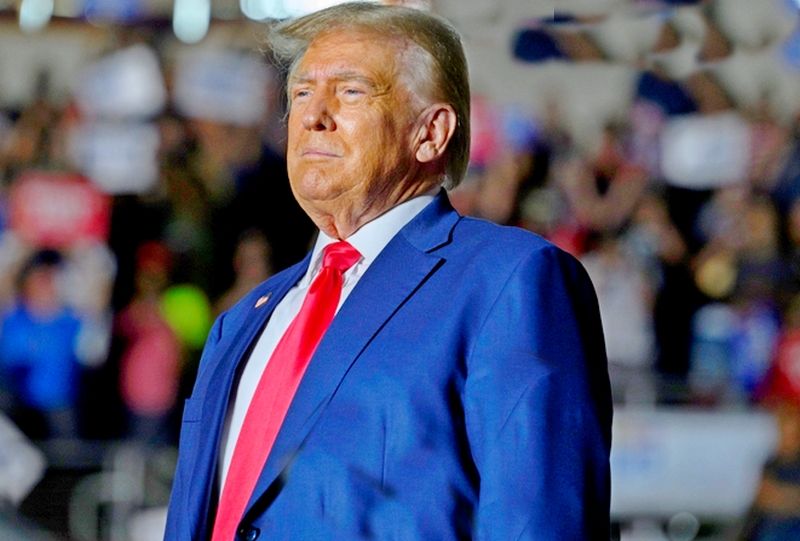
By The Epoch Times - Janice Hisle - 8/1/2023
Special counsel Jack Smith levies 4 charges, including ‘conspiracy to defraud the United States. A grand jury in Washington approved felony charges on Aug. 1 against former President Donald Trump in connection with his efforts to dispute the results of the 2020 election and with the events of Jan. 6, 2021.
According to the indictment, Mr. Trump faces four federal charges arising out of a probe by special counsel Jack Smith: conspiracy to defraud the United States, conspiracy to obstruct an official proceeding, obstruction of an attempt to obstruct an official proceeding, and conspiracy to deprive citizens the “free exercise” of constitutional rights.
This is the second indictment arising from Mr. Smith's investigation. The former president is separately facing 40 counts relating to the alleged retention of classified documents at his home at Mar-a-Lago in Palm Beach, Fla.
The Trump campaign described the new indictment as a politically motivated attack.
"This is nothing more than the latest corrupt chapter in the continued pathetic attempt by the Biden Crime Family and their weaponized Department of Justice to interfere with the 2024 Presidential Election, in which President Trump is the undisputed frontrunner and leading by substantial margins," a Trump campaign spokesperson said in an email.
"But why did they wait 2 1/2 years to bring these fake charges, right in the middle of President Trump’s winning campaign for 2024? Why was it announced the day after the big crooked Joe Biden scandal broke out from the halls of Congress?"
Indictment
The 45-page indictment (pdf) charges Mr. Trump with an alleged "conspiracy" involving his efforts to challenge the results of the 2020 election.
"The purpose of the conspiracy was to overturn the legitimate results of the 2020 presidential election by using knowingly false claims of election fraud," the indictment reads.
It also lists six alleged co-conspirators. Four of them are attorneys. One was a Department of Justice official, and another was a political consultant. None are named.
Mr. Smith's indictment acknowledges that all Americans, including Mr. Trump, have a First Amendment right to publicly speak about the election and to even claim that he won. Mr. Trump also was "entitled to formally challenge" the election results, it states.
But the problem for him occurred when he allegedly "pursued unlawful means of discounting legitimate votes and subverting the election results," it states.
The alleged conspiracy, according to the indictment, included the spread of "false claims of election fraud" and the organization of alternate electors in seven states. The indictment makes mention of specific claims by Mr. Trump and his allies of voter fraud in states such as Georgia, Pennsylvania, Michigan, and Arizona. It relies mostly on statements from officials that have previously been used to challenge allegations of voter fraud.
It also claims that Mr. Trump had encouraged his supporters to come to Washington under what it alleges was a "false expectation that the Vice President had the authority to and might use his ceremonial role at the certification proceeding to reverse the election outcome."
Mr. Smith, at a brief press conference on Aug. 1, called the events of Jan. 6, 2021, "an unprecedented assault on the seat of American democracy," one "fueled" by lies aimed at disrupting the government's "bedrock function" of conducting and certifying elections.
The Trump campaign spokesperson said in a statement that the former president "has always followed the law and the Constitution, with advice from many highly accomplished attorneys."
"These un-American witch hunts will fail and President Trump will be re-elected to the White House so he can save our country from the abuse, incompetence, and corruption that is running through the veins of our country at levels never seen before," the spokesperson said.
Mr. Trump is scheduled to appear at a federal courthouse in Washington at 4 p.m. on Aug. 3.
Washington is Not Trump Country
The Jan. 6 case against Mr. Trump presents the prospect of a particularly hostile jury pool if the case remains in the city of Washington. There, nearly 77 percent of registered voters are Democrats and just 5 percent are Republicans, voter registration statistics show.
Many Jan. 6 defendants tried to get their trials moved elsewhere, asserting that supporters of Mr. Trump wouldn’t get a fair trial in Washington. But judges denied those requests. Among the Jan. 6 cases that went to trial, just two ended with acquittals on all charges; both of those cases were decided by a judge, not a jury.
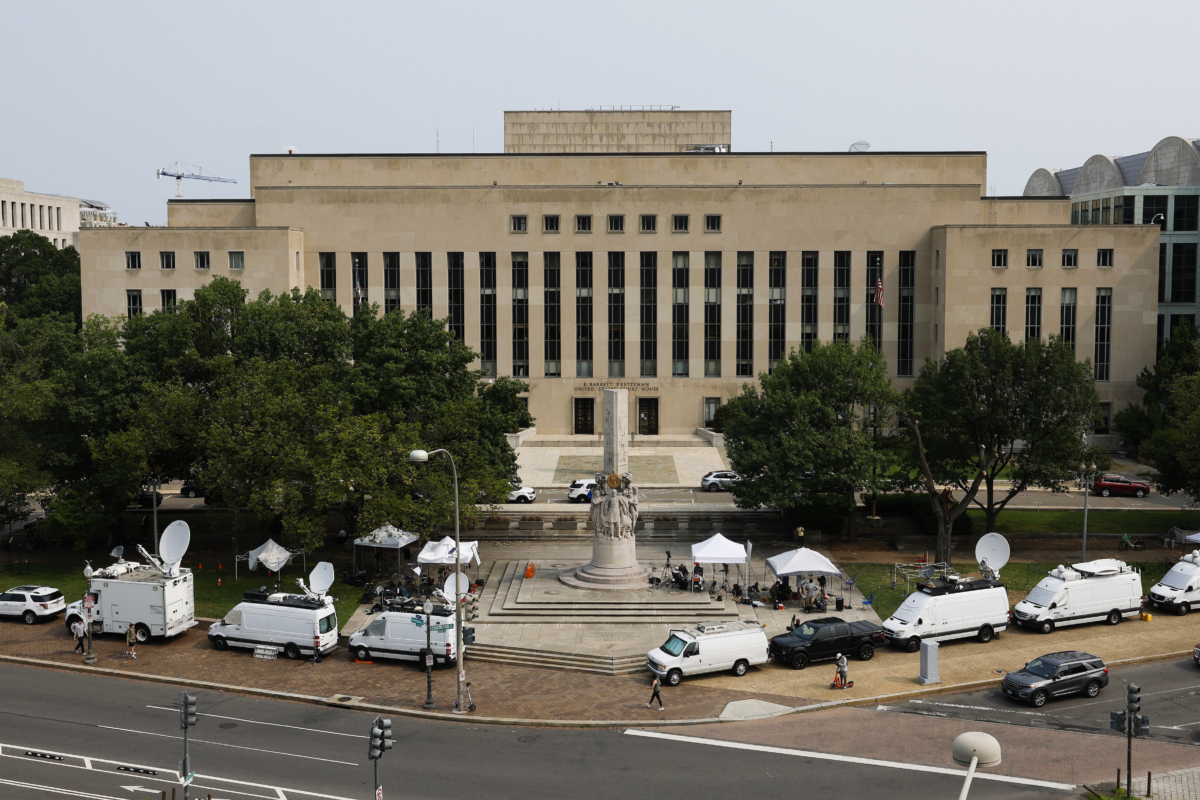
In a July 18 post on his platform Truth Social, Mr. Trump said he found it “interesting” that the notice of the imminent charges came on July 16, a Sunday night. That was less than 24 hours after he delivered a Florida speech in which he advocated that the federal government assume control of “a filthy, unsanitary, neglected and crime-ridden Washington, D.C.”
Yet that’s the location where Mr. Biden’s Department of Justice wants his trial to be held, “all because they think, especially after my strong words of a federal takeover at the speech, a D.C. jury will do whatever they [people in power] want,” Mr. Trump said.
Election 'Cheaters?'
All three prosecutions of Mr. Trump have come in the thick of his third run for the U.S. presidency, and a grand jury is at work in Georgia on a possible fourth indictment. That case revolves around the dispute over whether Mr. Trump truly lost the 2020 election in that state.
The former president asserts that he was exercising his constitutional right “to protest an election that [he was] fully convinced was rigged and stolen," just as the Democrats did in 2016, according to his July 18 post.
Mr. Trump alleges that “weaponized” federal agencies have refused to investigate election “cheaters.” Instead, the Justice Department and FBI “target and harass those who complain about the cheaters.”
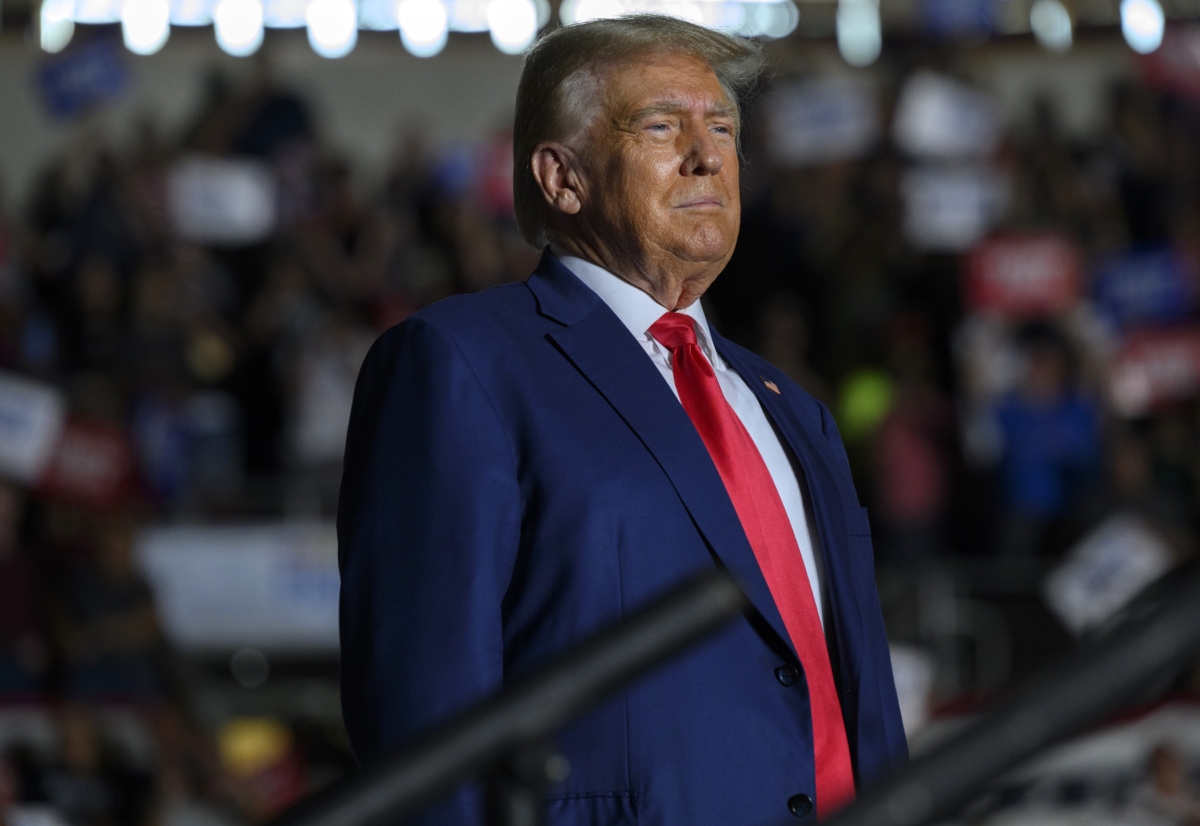
All the criminal cases lodged against him involve situations that occurred several years ago and thus amount to election interference, Mr. Trump and his allies say.
“The Democrat prosecutors waited years to bring charges so that they could interfere with the 2024 presidential election,” he wrote in a Truth Social post on July 19 in anticipation of the latest indictment. “They are getting, however, big blowback!”
But Mr. Trump’s detractors say he deserves the scrutiny and should be held accountable for wrongdoing that they believe he committed. His harshest critics allege that he summoned his “mob” of supporters to Washington on Jan. 6, 2021, to “overthrow” the government.
'In The Public Interest
The latest indictment of Mr. Trump comes eight months after Mr. Smith was appointed to investigate the former president on two fronts.
In June, Mr. Smith secured an indictment for Mr. Trump's alleged mishandling of classified records. The FBI seized those materials in an unprecedented raid of the former president's home in August 2022.
The Biden administration’s top prosecutorial official, Attorney General Merrick Garland, appointed Mr. Smith as special counsel on Nov. 18, 2022, three days after Mr. Trump announced his third run for the presidency.
At the time, Mr. Garland acknowledged that Mr. Trump's candidacy served as an impetus for the appointment of Mr. Smith.
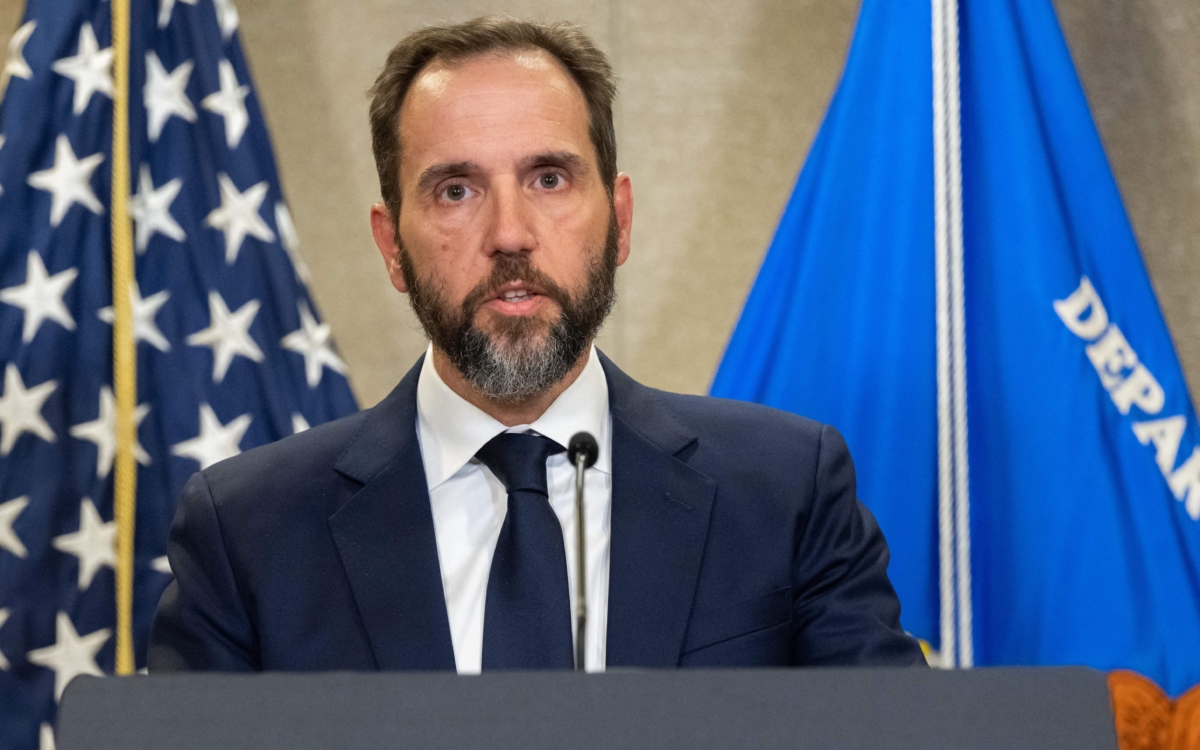
“Based on recent developments, including the former president’s announcement that he is a candidate for president in the next election, and the sitting president’s stated intention to be a candidate as well, I have concluded that it is in the public interest to appoint a special counsel,” Mr. Garland stated when he appointed Mr. Smith.
Regardless, Mr. Trump's detractors insist that the investigations are justified; Mr. Biden has denied influencing federal authorities' actions against Mr. Trump.
Mr. Trump maintains his innocence. In April, he pleaded not guilty to his first indictment for alleged violations of New York business records laws in 2017. In June, he pleaded not guilty to federal charges relating to his handling of classified records after he left the White House in 2021.
Campaign Continues
Despite Mr. Trump’s growing legal perils, he has forged ahead with campaign events.
On June 18, the same day he revealed the looming indictment, he participated in an Iowa town hall forum with voters and Fox News host Sean Hannity.
On July 19, Mr. Trump hosted a screening of the surprise blockbuster “Sound of Freedom” at his golf club in Bedminster, New Jersey.
On July 20, his campaign released a new one-minute video advertisement. Shot in stark black-and-white, a stone-faced Mr. Trump strides purposefully along a corridor. “This is the final battle,” Mr. Trump says, in a voiceover.
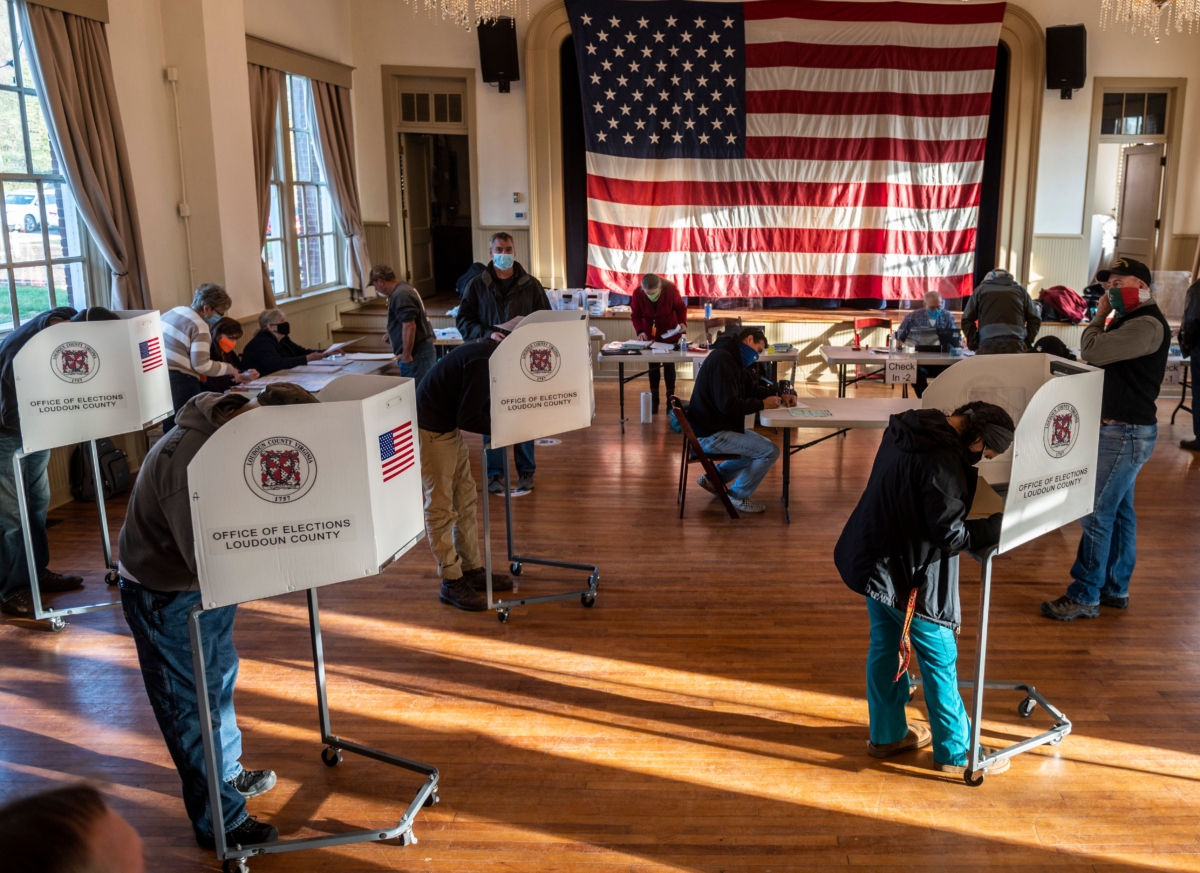
“With you at my side, we will demolish the deep state. We will expel the warmongers from our government. We will drive out the globalists, we will cast out the communists, Marxists, and fascists,” he says, as sounds of a crowd cheering in the background swell.
“We will throw off the sick political class that hates our country. We will rout the fake news media, and we will liberate America from these villains, once and for all.”
The video ends with dramatic music as the words “Join President Trump’s fight for America” appear in white on a black screen.
In revealing the imminent indictment, Mr. Trump asserted that he has endured multiple “hoaxes and scams made up to stop [him]from fighting for the American people.
"But I will never stop!” he says.
TIMELINE OF EVENTS
Overview of key events that preceded the indictment of Mr. Trump in connection with the Jan. 6 unrest.
2021
Jan. 6
Supporters of then-President Trump converge in Washington for a “Save America March.” As later reported, the plan was for supporters to hold a rally at The Ellipse, just south of the White House. Then they would march to the Capitol to demand that Congress and Vice President Mike Pence reject electoral votes for Democratic presidential candidate Joe Biden from states where election results were marred by irregularities, allegations of fraud, and unconstitutional voting rule changes.
Around noon, Mr. Trump gives a speech to a massive crowd. Selected quotes from that speech, urging supporters to “fight” to uphold democracy, would be used to allege that he incited the unrest that later ensued. However, Mr. Trump also states that the marchers would proceed “peacefully and patriotically” to the Capitol and make their voices heard—a quote that some left-leaning media outlets omit from their coverage of the event.
Before his speech finishes, many people leave to begin the mile-long walk to the Capitol, so they could be present for the electoral vote count, set for 1 p.m. By that time, hundreds of people are gathered nearby.
Just after 12:50 p.m., some 25 minutes before Mr. Trump finishes his speech at The Ellipse, agitators breach a lightly guarded police barricade on the west front of the Capitol. Within minutes, thousands of protesters streamed onto the west plaza.
Although tens of thousands of protesters remain peaceful, a sizable number of them skirmish with police; some break into the U.S. Capitol. More than 1,000 people would later be charged. Some were arrested for vandalizing the building and attacking police; others were charged for actions such as walking through open doors and strolling through the corridors.
Police fatally shoot protester Ashli Babbitt as she tries to climb through a broken window. Another supporter of Mr. Trump, Rosanne Boyland, dies after a surging crowd knocks her down and people pile on top of her; a police officer beats her unconscious body with a large wooden stick, video footage would reveal more than a year later. However, no one would be charged for either of those deaths, and Ms. Boyland’s death would later be attributed to a drug overdose, a ruling her family would later challenge publicly. Two other people die of natural causes (a heart attack and stroke).
At 3:13 p.m., Mr. Trump posted on Twitter, “I am asking for everyone at the U.S. Capitol to remain peaceful. No violence! Remember, WE are the Party of Law & Order–respect the Law and our great men and women in Blue. Thank you!”
After 4 p.m., he posts a video on social media sites including Twitter, telling supporters: “You have to go home now. We have to have peace. We have to have law and order.” Twitter later removes that tweet, although it remains available on other websites such as C-Span.org.
Around 8 p.m., Capitol police declare the building secure, allowing the return of lawmakers who had been evacuated via underground tunnels.
Jan. 7
In the early morning hours, Congress certifies Mr. Biden’s victory after hours of debate over alleged election irregularities in states such as Arizona, Georgia, and Pennsylvania.
In a joint statement, Democrat leaders of the House and Senate disclose that they are urging Mr. Pence “to invoke the 25th Amendment, which would allow the vice president and a majority of the cabinet to remove the president for his incitement of insurrection and the danger he still poses.” They threaten to impeach the president if Mr. Pence fails to act. (Democrats’ previous attempt to impeach Mr. Trump failed a year prior.)
Later that day, after Democrats said they did not get a response from Mr. Pence, Rep. Sheila Jackson Lee (D-Texas) introduces articles of impeachment against Mr. Trump, whose term would expire in 13 days.
That evening, Mr. Trump posts a Twitter video condemning the violence, telling people that “tempers must be cooled and calm restored.” He notes that his campaign “vigorously pursued every legal avenue to contest the election results.” He also says his “only goal was to ensure the integrity of the vote,” and “I was fighting to defend American democracy.”
Acknowledging that a new administration would be inaugurated on Jan. 20, he commits to a smooth transition of power. “This moment calls for healing and reconciliation,” Mr. Trump says, noting the challenges of the COVID-19 pandemic and its toll on countless lives and the U.S. economy. He says it has been “the honor of my lifetime” to serve as president. “Our incredible journey is just beginning,” he says.
Authorities reveal that at least 57 officers were injured and 68 people were arrested; they also announce that the chief of the Capitol police had resigned.
Later that night, Capitol Police Officer Brian Sicknick dies; media reports soon incorrectly blame his death on assaults from protesters, including being reportedly struck with a fire extinguisher at the Capitol. (Months later, a medical examiner reports that the officer died from a pair of strokes and suffered from no internal or external injuries. However, the report acknowledges that everything that happened on Jan. 6 "played a role in his condition." Two men were accused of spraying a chemical irritant at Sicknick.)
Various media, including The Associated Press, sanction the use of the term “insurrection” to describe the events of Jan. 6.
Jan. 10
In a text message, Stewart Rhodes III issues an ominous warning intended for Mr. Trump. Mr. Rhodes, an Army Airborne veteran, and Yale law graduate, founded the Oath Keepers, a group of current and former military members who seek to defend the U.S. Constitution.
Mr. Rhodes composes a message on the cellphone of a man with “indirect” ties to Mr. Trump. In the message, Mr. Rhodes urges Mr. Trump to invoke the Insurrection Act to stop Mr. Biden, an “illegitimate” president, from assuming control of the U.S. military, and that if Mr. Trump fails to take that action, the new administration “will turn all that power on you, your family, and all of us...You and your children will die in prison.”
Although that message was never delivered to Mr. Trump, it becomes part of the federal government’s case against Mr. Rhodes; he is later convicted of seditious conspiracy for his involvement in the events of Jan. 6, and is sentenced to 18 years in prison.
Jan. 12
Vice President Mike Pence rejects calls for him to remove Mr. Trump from office under the 25th Amendment.
Jan. 13
The Democrat-led House votes to impeach Mr. Trump. Minutes later, Senate Minority Leader Mitch McConnell (R-Ky.) writes that he hadn’t made a final decision on how he would vote at the Senate trial.
Jan. 25
The House transmits an article of impeachment on “incitement of insurrection” during a ceremonial walk across the Capitol to the Senate.
At the same time, Democrats explore using the 14th Amendment’s “insurrection” clause to bar Mr. Trump from ever holding future office in the United States.
Feb. 2
Through his lawyers, Mr. Trump issues a response to the impeachment allegations, saying that impeaching a former officeholder is unconstitutional. If an officeholder is convicted of crimes against the United States, the punishment is removal from office—which no longer applies to Mr. Trump—along with disqualification from holding any future office. Mr. Trump's supporters assert that Democrats' ultimate goal in impeaching Trump is to prevent him from running for president again in 2024.
Feb. 6
Noted legal scholar Alan Dershowitz opines that Congress “put itself above the law” in impeaching Mr. Trump.
Feb. 9
By a vote of 56–44, the Senate declares the impeachment proceeding is constitutional despite Mr. Trump’s status as a former officeholder. Forty-four Republicans vote against it but six Republicans join Democrats in voting for the trial to move forward.
The trial kicks off as Democrats allege Mr. Trump committed a “grievous constitutional crime,” while his attorneys dismiss the allegations as “political theater.”
Feb. 10
House impeachment managers quote Trump’s Jan. 6 speech, highlighting the fact that he told supporters to “fight like hell” as an example of him inciting violence. But the House Judiciary GOP points out that impeachment managers failed to acknowledge that Mr. Trump had also told protesters to march “peacefully and patriotically” to the Capitol. Rep. Jim Jordan (R-Ohio) calls those words the “most important” part of Mr. Trump’s speech.
Impeachment managers present no new evidence to support their allegation that Mr. Trump incited an insurrection. Instead, they allege that Mr. Trump’s past speeches helped stoke his supporters’ passions until they boiled over on Jan. 6.
The managers make no mention of Mr. Trump’s repeated offers to deploy thousands of National Guard troops to Washington ahead of Jan. 6 to quell potential violence. Mr. Trump’s former chief of staff, Mark Meadows, says the president’s offers were rejected.
Sen. Lindsey Graham (R-S.C.) says the case against Mr. Trump is “collapsing,” causing the number of expected not-guilty votes to grow. He predicts the trial will conclude in a matter of days.
Feb. 11
Impeachment managers, headed by Rep. Jamie Raskin (D-Md.), finish their two-day presentation of the case against Mr. Trump. They play audio and video recordings of rioters saying that they stormed the Capitol at Mr. Trump’s request. No witnesses are called to testify.
Sen. Rand Paul (R-Ky.) says he finds it “extraordinary” that impeachment managers admitted “President Trump was not impeached for his words.” Instead, they said he was impeached because “he advocated that the election was stolen,” Mr. Paul said. However, he notes that Democrats, including Mr. Raskin, 2016 presidential candidate Hillary Clinton, and House Speaker Nancy Pelosi (D-Calif.) previously made that claim about the 2016 election, which Mr. Trump won.
Sen. Ted Cruz (R-Texas), an attorney, criticizes impeachment managers for presenting “virtually no argument” on how Mr. Trump’s actions met the legal standard of incitement. He says that if phrases such as “fight like hell” qualify, “then every single politician in America is guilty of incitement,” Mr. Cruz said. “Because I guarantee you all 100 senators in that chamber have stood on the stump and said we need to ‘fight or fight like hell.'”
Feb. 12
One of Mr. Trump’s attorneys, David Schoen, presents evidence that House Democrats “selectively edited the president’s words” and otherwise manipulated video clips.
Mr. Trump’s lawyers also accuse Democrat legislators of hypocrisy. They play numerous video clips showing members of Congress and other elected officials talking about assaulting Mr. Trump, threatening his supporters, and backing past, often violent, protests involving Black Lives Matter and Antifa. Anarchists, for example, staged a sustained attack on a federal courthouse in Portland, Oregon, but Ms. Pelosi did not use the word “insurrection” to describe that incident. Instead, she remarked, “People will do what they do.”
Several Democrats, including Sen. Richard Blumenthal (D-Conn.), smile or laugh while the videos play. After the session, Mr. Blumenthal accuses Mr. Trump’s attorneys of “trying to draw a dangerous and distorted equivalence.” He calls their presentation “a distraction from Donald Trump inviting the mob to Washington.”
Mr. Biden states that he was not pressuring Republican senators on how to vote on Mr. Trump’s impeachment, but he says it would be interesting to see “if they stand up.”
As the process continues, Mr. Trump remains uncharacteristically quiet, partly because Big Tech platforms such as Twitter and Facebook have suspended his accounts, effectively silencing him. Twitter says he is permanently banned. However, in late 2022, new Twitter owner Elon Musk would reinstate Mr. Trump’s account after taking a public poll on the platform. At last check, Mr. Trump had not returned to Twitter. Instead, he has continued to rely on Truth Social, which he founded. It went live in February 2022.
Feb. 13
The Senate votes to acquit Mr. Trump by a vote of 57–43, clearing him of the impeachment charge of “incitement of insurrection.” Seven Republicans join all of the Democrats in voting to convict Mr. Trump, but the total falls 10 votes short of the 67 votes needed. The seven Republicans voting with Democrats are Sens. Richard Burr (R-N.C.), Bill Cassidy (R-La.), Susan Collins (R-Maine), Lisa Murkowski (R-Alaska), Mitt Romney (R-Utah), Ben Sasse (R-Neb.) and Pat Toomey (R-Pa.)
Mr. McConnell votes to acquit but makes remarks highly critical of the former president, drawing later criticism from some of his GOP colleagues. The Senate votes to call witnesses but decides that would amount to a wasted effort because they didn’t have the necessary votes to convict anyhow. Forty-five Republicans vote to declare it unconstitutional to impeach Mr. Trump because he had left the presidency.
The former president issues a statement reacting to his acquittal: “It is a sad commentary on our times that one political party in America is given a free pass to denigrate the rule of law, defame law enforcement, cheer mobs, excuse rioters, and transform justice into a tool of political vengeance, and persecute, blacklist, cancel and suppress all people and viewpoints with whom or which they disagree.”
“I always have, and always will, be a champion for the unwavering rule of law, the heroes of law enforcement, and the right of Americans to peacefully and honorably debate the issues of the day without malice and without hate,” Mr. Trump says.
Feb. 23
The former chief of the Capitol Police testifies to senators, alleging that other agencies failed to respond to his requests for assistance prior to Jan. 6.
2022
July 22
“The Real Story of Jan. 6” premieres on EpochTV. The documentary counters the carefully crafted narrative that Americans have been fed. It features stories of people who were there and examines the actions of police and other government officials. It is available at epoch to. shop/jan6.
Nov. 15
Mr. Trump announces he is running to once again become the Republican Party's presidential nominee in the 2024 election.
Nov. 18
Attorney General Merrick Garland announces that Jack Smith has been appointed as a special counsel to look into Mr. Trump’s handling of presidential records and documents with classified markings. In making his announcement, Mr. Garland acknowledges that the decision was influenced by Mr. Trump's candidacy.
“Based on recent developments, including the former president’s announcement that he is a candidate for president in the next election, and the sitting president’s stated intention to be a candidate as well, I have concluded that it is in the public interest to appoint a special counsel,” Mr. Garland said.
Mr. Smith is also tasked with overseeing the Washington-based investigation of alleged interference with the transfer of power following the 2020 presidential election. Mr. Smith, in a statement released by the DOJ, vows to pursue the investigations “Independently” and “thoroughly.”
Nov. 21
Within days of Mr. Smith’s appointment, conservatives raise concerns about his impartiality, noting that his wife donated to Mr. Biden’s 2020 campaign and produced a film for former First Lady Michelle Obama.
Dec. 28
The House Select Committee investigating Jan. 6 writes a letter withdrawing the subpoena it previously issued to Mr. Trump, saying that the committee’s work was ending and “the Select Committee can no longer pursue the specific information covered by the subpoena.”
2023
Jan. 3
A new session of Congress begins. Republicans take control of the House, while Democrats retain control of the Senate.
Feb. 15
Mr. Pence reveals that Mr. Smith has subpoenaed him to testify against Mr. Trump in the Jan. 6 probe. In subsequent months, reports would leak out about other close associates of Mr. Trump being compelled to testify.
June 2
Following recent convictions of high-profile Jan. 6 defendants, analysts predict that prosecutors may feel emboldened to pursue charges of “seditious conspiracy” against Mr. Trump, although they say he appears to have strong plausible defenses against such a charge.
June 8
Mr. Trump and an aide, Walt Nauta, are indicted for alleged mishandling of government records with classified markings. Mr. Smith’s securing of that indictment fuels more speculation that an indictment could be forthcoming in the Jan. 6 probe that he has also been heading. June 23
House Speaker Kevin McCarthy says he supports efforts to expunge the two impeachments of Mr. Trump.
July 18
Mr. Trump reports that on July 16, a Sunday night, his attorneys received a letter informing him that he was a target of Mr. Smith’s Washington grand jury, signaling that an arrest and indictment appear to be imminent. According to a post on his Truth Social account, Mr. Trump said Mr. Smith gave him four days to appear before the grand jury.
The Epoch Times reports that Julie Kelly, an independent journalist who has closely followed the trials of the Jan. 6 defendants, believes Mr. Trump will be indicted for “seditious conspiracy.” The law covers attempts to forcibly overthrow the government as well as any attempt to “prevent, hinder or delay the execution of any law of the United States.”
July 19
Authorities were still holding about 145 people as prisoners in connection with the events of Jan. 6, according to a database compiled by the nonprofit group, LookAheadAmerica.org. Many have been held for more than 800 days without a trial, the organization says.
Members of Congress react to Mr. Trump's imminent indictment, with Republicans decrying the continued "weaponization" of the justice system and Democrats repeating an oft-used phrase since Trump's first indictment was revealed in March: "No one is above the law."July 23
A former acting attorney general during Mr. Trump's administration, Matt Whitaker, tells Newsmax's "Sunday Report:" "It just isn't consistent with our system of justice with equal protection under the law." He also says he believes all of Mr. Trump's Jan. 6 statements should fall under "First Amendment-protected speech."July 27
Two attorneys who represent Mr. Trump, Todd Blanche and John Lauro, meet in Washington with federal prosecutors in connection with the case, as a grand jury convenes, NBC News reports, citing anonymous sources.
Joseph M. Hanneman and Ivan Pentchoukov contributed to this report.
KEEP YOUR HANDS OFF AMERICA’S FREEDOMS & LIBERTIES & KEEP YOUR HANDS OFF OUR GREATEST PRESIDENT TRUMP, OR THERE WILL BE HELL TO PAY!!🗽 🇺🇲 🙏 TRUMP 2024! 🇺🇲 ⚖️🗽🙏

Janice HisleAuthor (Reporter)
Janice Hisle reports on former President Donald Trump's campaign for the 2024 general election ballot and related issues. Before joining The Epoch Times, she worked for more than two decades as a reporter for newspapers in Ohio and authored several books. She is a graduate of Kent State University's journalism program. You can reach Janice at: janice.hisle@epochtimes.us

